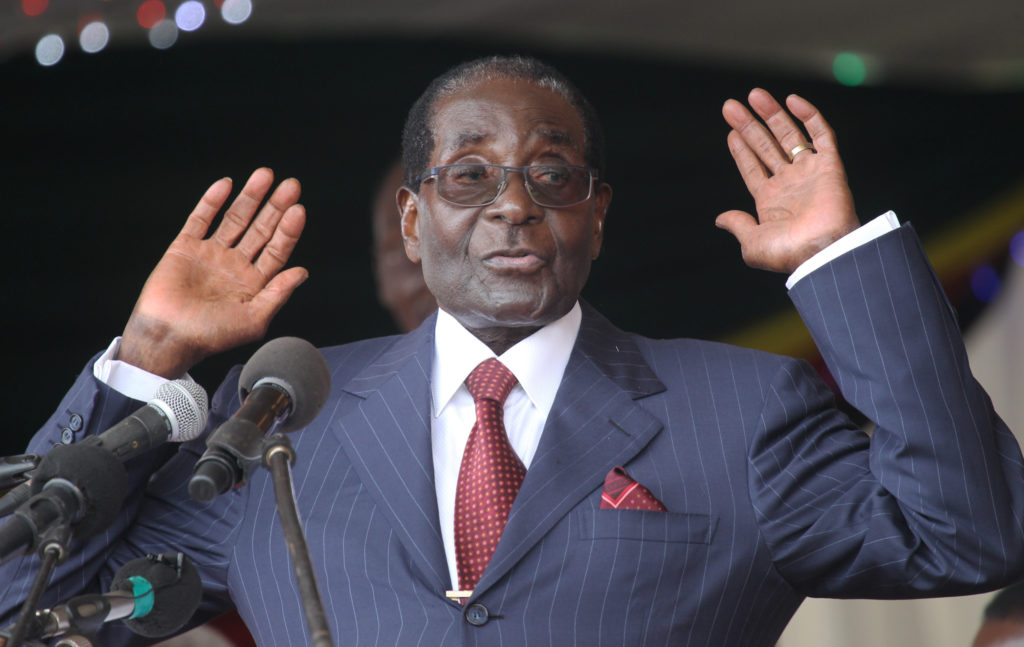
Soldiers took over the headquarters of Zimbabwe’s ZBC state broadcaster in the early hours of Wednesday, two members of staff and a human rights worker said, compounding speculation of a coup against 93-year-old President Robert Mugabe.
Some ZBC members of staff were manhandled when soldiers occupied the premises, the sources said. However, staff were told they “should not worry” as the soldiers were merely there to protect the site, one source added.
Zimbabwe’s military said on Wednesday it had seized power in a targeted assault on “criminals” around President Robert Mugabe who were causing social and economic suffering, but gave assurances the 93-year-old leader and his family were “safe and sound”.
In a short broadcast on national television, which was seized overnight by soldiers, a spokesman for the military said it expected “normalcy” to return as soon as it had completed its “mission”.
The military detained Finance Minister Ignatius Chombo on Wednesday, a government source said. Chombo was a leading member of the so-called ‘G40’ faction of the ruling ZANU-PF party, led by Mugabe’s wife Grace, that had been vying to succeed Mugabe.
Soldiers deployed across the Zimbabwe capital Harare and seized the state broadcaster after Mugabe’s ruling ZANU-PF party accused the head of the military of treason, prompting frenzied speculation of a coup.
Just 24 hours after military chief General Constantino Chiwenga threatened to intervene to end a purge of his allies in Mugabe’s ZANU-PF, a Reuters reporter saw armored personnel carriers on main roads around the capital.
Aggressive soldiers told passing cars to keep moving through the darkness. “Don’t try anything funny. Just go,” one barked at Reuters on Harare Drive.
Two hours later, soldiers overran the headquarters of the ZBC, Zimbabwe’s state broadcaster and a principal Mugabe mouthpiece, and ordered staff to leave. Several ZBC workers were manhandled, two members of staff and a human rights activist said.
Shortly afterwards, three explosions rocked the center of the southern African nation’s capital, Reuters witnesses said.
Mugabe, the self-styled ‘Grand Old Man’ of African politics, has led Zimbabwe for the last 37 years.
In contrast to his elevated status on the continent, Mugabe is reviled in the West as a despot whose disastrous handling of the economy and willingness to resort to violence to maintain power destroyed one of Africa’s most promising states.
The United States and Britain advised their citizens in Harare to stay indoors because of “political uncertainty.”
“U.S. citizens in Zimbabwe are encouraged to shelter in place until further notice,” the U.S. statement said. The British Foreign & Commonwealth Office statement told “nationals currently in Harare to remain safely at home or in their accommodation until the situation becomes clearer.”
The Southern African nation has been on edge since Monday when Chiwenga, Commander of the Zimbabwe Defence Forces, said he was prepared to “step in” to end a purge of supporters of sacked vice president Emmerson Mnangagwa.
Only a few months ago, Mnangagwa, a former security chief nicknamed “The Crocodile”, was favorite to succeed his life-long political patron but was ousted a week ago to pave the way for Mugabe’s 52-year-old wife Grace to succeed him.
Chiwenga’s unprecedented statement represented a major escalation of the struggle to succeed Mugabe, the only leader Zimbabwe has known since it gained independence from Britain in 1980.
Mugabe chaired a weekly cabinet meeting in the capital on Tuesday, officials said, and afterwards ZANU-PF said it stood by the “primacy of politics over the gun” and accused Chiwenga of “treasonable conduct … meant to incite insurrection.”
The previous day, Chiwenga had made clear the army’s refusal to accept the removal of Mnangagwa – like the generals a veteran of Zimbabwe’s anti-colonial liberation war – and the presumed accession of Grace, once a secretary in the government typing pool.
Local government minister Saviour Kasukuwere, a leading figure in her relatively youthful ‘G40’ faction, refused to answer Reuters questions about the situation in Harare. “I‘m in a meeting,” he said, before hanging up shortly before midnight.
Army, police and government spokesmen refused to answer numerous phone calls asking for comment.
